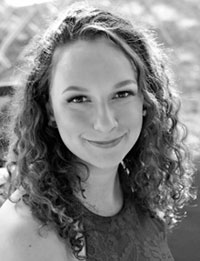AVIVA-Berlin >
Jüdisches Leben > Mia's column
AVIVA-BERLIN.de 7/20/5786 -
Beitrag vom 14.09.2019

Uncovering Jewish Venice. Reflections on Being Jewish by Mia Szarvas
Mia Szarvas
The participation and contribution of Jews and Jewish culture in the history of Europe is often erased in common retelling. When it is remembered, it is often thought of as separate from the larger communities within which they lived. However, Jews were often integral to the prosperity of these communities, and their cultural legacies are still intertwined with the cultures from which they were purged. The loss of these cultural legacies is a loss so profound, it can be almost completely invisible.
On a recent trip to Italy, I finally had the chance to visit Venice. The city floating in the Aegean Sea, propped up on wooden stilts, sinking slowly into the ocean. On every corner and in every square, the noble city brags and boasts of its rich past. Venice, the shining star of the bygone Venetian Republic, was a city made wealthy by trade between east and west. It was a nexus, a cultural and geographical intersection, and it was unique.
During my trip, I went to visit the Jewish Museum in the historical Jewish quarter, as I often do when visiting a city in Europe. These trips are fascinating, but haunting. It is a strange reality when you can only access your culture in a museum. When the living breathing legacy is gone, and all that is left are relics for visitors to ogle. Like only seeing your loved ones in photos behind dusty glass, or only constructing the image of a dinosaur from its bones.
Nevertheless, if Jewish culture is all but extinguished in a city, piecing together an image of what it once was will have to do. I walked from my hotel near the center to the further reaches of the city, as one often does when trying to access the place where Jews were permitted to live. As I got closer to the Ghetto, the streets got quieter. There was a peaceful air as I approached the bridge to the "Ghetto Nuovo", the New Ghetto, which I later learned, is actually the oldest ghetto in Europe. On a tour of the ghetto I visited three of the five synagogues crammed around a tiny market square. The synagogues were each from a different community - there were once German, French, Italian, and two different Sephardic communities living in these cramped quarters. The communities came from different worlds, fleeing persecution for the relative freedom of the Venetian Republic. They lived somewhat freely for a few decades, intermingling with the other inhabitants of the city. Jews, unlike their Catholic compatriots, were allowed to lend money, which proved an important asset in the medieval trade city of Venice. They also were some of the best and most important doctors in Venice.
In the late 16th century, the Venetian Republic received a complaint from the Pope. The Catholic Church did not like that Venice was allowing its Jews to live and work in the city. The Venetian Republic was diplomatic. It wanted to keep its political ties as well as its economy strong, so it sought to preserve relationships with both parties. The republic relegated its Jews the area of the city where the foundries were, (ôÇgettoôÇ is foundry in Italian), and imposed a curfew at midnight. The Jews were allowed to still live in the city and do business outside of the getto during the day. This way, Venice appeased the Church by keeping the Jews separate from the Christians in the getto, yet benefited from the services Jews provided to the republic. Thus, out of diplomacy, was born the concept of the getto, the very first ghetto in Europe (ôÇghettoôÇ is the germanization of the Italian word getto).
On the tour I visited the German synagogue, decorated with typically Venetian, ornate gold leaf and red velvet tapestries. As I stood inside, contemplating how integral jews had been to the success of the Venetian Republic, and how IôÇd never heard this part of the romantic cityôÇs history, a recurring thought surfaced in my mind. Jews had been living in Europe for thousands of years before the Holocaust. Jews paid huge contributions to the culture of the places they called home. Jewish and Venetian culture are one and intertwined, just as is Jewish and German culture, from latkes ("Kartoffelpuffer"), and challah ("Hefezopf"), to Kafka and Einstein. When we remember the Holocaust, we often remember the human victims. The lives lost. The families torn apart. The human suffering, cost, and toll. When Jews return to a place, we celebrate that the culture has been revived, re-flourishing, renewed.
In Bremen, the city I live in, there are just over one thousand Jews - a good number for a small German city. Before the war, there were just about double. From pure numbers one may experience this as a victory, and in some ways, it certainly is. But we are not the same Jews. We are not the children of the names etched into the stumbling stones (brass plaques comemorating Holocaust victims) down the street from where I live. Most Bremer Jews speak Russian, not German, as their first language. The simple truth is, when the Jews of Bremen were killed in the 1940s, their unique culture died with them. Their Bremer Jewishness, that had been built over a thousand years, died. And we are still suffering this loss. And this loss is even more invisible than the loss of the souls who lived and breathed this culture. This loss is so profound, that we donôÇt know that weôÇve lost something.
I wonder what other invisible contributions Jews made to their cities, countries, and communities. Where else were they the cornerstone of the economy, performing tasks and trades that no one else would or could? Which culinary traditions started in ghettos, how many folk songs were first uttered by Jewish Germans? When I think of all the unseen, and often erased cultural legacies, it feels too large to handle. But we can slowly begin to recover our losses by remembering the parts we know. And when we remember the contributions Jewish Germans, Spaniards, or Venetians made, we can begin to remember that they were not ôÇotherôÇ or a ôÇside-noteôÇ, but an integral part of the fabric that gave birth to the world we know today. Jewish history belongs to everyone, and everyone suffers from the erasure of this cultural legacy. My Jewish traditions of today would not exist without German influence, and the Germany I know today would not exist without Jewish Germans. Without Jews, Venice would not have been so prosperous, and I would not have had the chance to spend time in an ancient, sinking, beautiful city.
More information about Jewish life in Venice" at:
Museo ebraico di Venezia > www.museoebraico.it
New York Times > www.nytimes.com
Chabad of Venice > www.jewishvenice.org
About: Mia Szarvas was born in Vermont to an Israeli father and Italian-American mother, raised in California, and currently lives in Bremen, Germany. Her grandmother, Marta, escaped from Poland in August of 1939 with her parents and sister, with whom she set up a new life in Palestine, while the family they left behind perished in the Holocaust. Mia has a degree in Political Ecology from the University of California, Berkeley, and works in tech to create empowerment in unexpected places. She is curious about multiculturalism, languages, feminism, and how our intertwined histories inform the present.
Follow MiaôÇs art project "Humans Who Inspire" on Instagram @humanswhoinspire. Mia draws portraits of humans who inspire her as a meditation on the multitude of incredible humans working to make the world a better place. She also accepts requests and submissions.
Read more by Mia Szarvas at AVIVA-Berlin:
"LetôÇs Get Uncomfortable..." Reflections on Being Jewish in Germany by Mia Szarvas
"I Answered All Your Question About Jews, so You DonôÇt Have To (And so I DonôÇt Have To)" - reflections by Mia Szarvas
"I DonôÇt Want Your Shame" - reflections by Mia Szarvas
Yom HaShoah - reflections by Mia Szarvas

Photo of Mia Szarvas by Elena Sloman